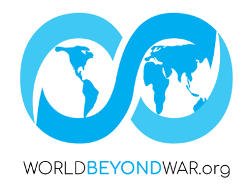
Dear John,
What happens when the law protects war instead of peace? Can it be reclaimed—for justice, accountability, and the well-being of people and the planet?
Join us for War, Peace, and Law—a powerful six-week online course starting Monday, August 4—that explores how legal systems enable violence—and how they can be reclaimed, reimagined, and transformed to protect people, planet, and peace.

🕊️ Starts August 4 – Enroll Now
📅 6-week course: August 4 – September 14, 2025
📍 Format: Online (6 self-paced modules + 3 live global sessions)
🎥 Watch video overview
🌐 Register today
⏳ Spaces are limited—secure your spot now
The overview below explains why this course matters, what it covers, how it works, and who it is for.
Why This Course Matters
The rule of law is not optional—it is the foundation of peaceful societies. Without it, there can be no justice, accountability, or order.
Yet today, war crimes go unpunished, legal systems shield militarism, and law—nationally and internationally—is bent, broken, or weaponized. From Gaza to Ukraine, Myanmar to Sudan, it is used not to prevent violence, but to justify it.
As governments criminalize dissent and defy international norms, reclaiming legal frameworks for peace and justice has never been more urgent.
Yet law can also be a tool for good. Just last week, the International Court of Justice ruled that states must reduce greenhouse gas emissions—after youth and Indigenous leaders took them to court to defend the right to a livable planet. This is one of many examples where people are using law to protect life, uphold rights, and challenge systemic harm.
War, Peace, and Law is not only about exposing injustice—it is about transforming it. This course explores how communities and movements are resisting war and building fairer systems by working within—and sometimes against—the law, helping to move us closer to our shared goal: a world beyond war.
What the Course Covers
This course provides an in-depth and user-friendly introduction to the “why,” “what,” and “how” of war, peace, and law, including:
-
Why law matters in shaping peace or war
-
What legal systems and traditions support justice and accountability
-
How people use—and break—the law to defend life and protect the planet
From high-level legal analysis to everyday activism and grassroots resistance, this course offers tools, strategies, frameworks, global examples, and real connections to support your learning and action.
Who the Course is For
This course is open to everyone—whether new to the topic or already working in peacebuilding, law, civil rights, conflict resolution, justice, or related fields. No prior legal experience is required.
It is especially relevant for those in:
- Civil society, law, governance, and diplomacy
- Education, journalism, international affairs, and human rights
- Activism, social enterprise, and religious leadership
Whether you are a student, educator, or a seasoned professional, the course brings together scholars, researchers, policy-makers, and practitioners committed to building just and peaceful alternatives—and offers you tools to deepen your work and clarify why it matters.
What You Will Gain
You will:
-
Examine how constitutions, courts, and civil resistance can sustain or challenge war
-
Analyze real-world examples—truth commissions, climate rulings, anti-protest laws, media repression, and war crimes tribunals.
-
Explore diverse legal traditions—including Ubuntu justice, Rwanda’s Gacaca courts, and Indigenous law
-
Apply insights in your work—whether in education, research, advocacy, organizing, or policymaking
-
Engage with a vibrant global network of changemakers through interactive forums and live sessions
-
Access award-winning resources and receive a certificate of completion from World BEYOND War
-
Join a growing World BEYOND War alumni network of over 3,000 people working on pro-peace and anti-war initiatives around the world
This course empowers you to act—by giving you the tools to challenge repression, advance justice, and build a world beyond war.
How the Course Works
The course includes:
-
Six self-paced weekly modules with videos, readings, and reflection tasks
-
Three live, interactive sessions with international facilitators and fellow learners
Together, these elements create a learning space that is strategic, participatory, and action-oriented.
The course is delivered entirely online through a user-friendly learning platform. After registering, you will receive clear, step-by-step instructions to access the platform and begin the course. The platform is intuitive and accessible, designed to support a smooth and flexible learning experience.
Meet the Facilitators
You will learn from a diverse, globally respected team of experts—including a multiple Nobel Peace Prize nominee and multiple PhD holders—who bring decades of experience across regions, disciplines, and sectors, including law, diplomacy, peacebuilding, education, and grassroots activism. Facilitators include:
🟢 Dr. Yurii Sheliazhenko (Ukraine)
Legal scholar and peace activist. Executive Secretary of the Ukrainian Pacifist Movement, board member of World BEYOND War, and 2022 Sean MacBride Peace Prize laureate.
🟢 Andrew Cheatham (USA)
International lawyer and former UN official with experience in Iraq, Libya, and Somalia. Chief Counsel at Pragmatic Panic Legal and Senior Research Fellow at King’s College London, with expertise in AI, war, and legal resilience.
🟢 Dr. Bishnu Pathak (Nepal)
Transitional justice pioneer and six-time Nobel Peace Prize nominee. A prolific author and long-time collaborator of Johan Galtung, known for innovating new models for conflict transformation and human rights.
🟢 Hans Hedrich (Romania)
Political scientist, environmental advocate, and civil rights campaigner. Co-coordinator of World BEYOND War’s Romania chapter and leader of democracy and environmental protection campaigns in post-communist Europe.
🟢 Daniel Carlsen (Bolivia/Norway)
Lawyer and peace educator working to advance a culture of peace across South America through university programs and community-based initiatives, including with World BEYOND War’s Bolivia chapter.
🟢 Dr. Sellah King’oro (Kenya)
Human rights lawyer, peace and security expert, and board member of World BEYOND War. Recipient of peace awards and contributor to reconciliation efforts across Africa.
📽️ Get to know the facilitators in their own words:
Watch these short video introductions:
▶️ Bishnu Pathak (Nepal)
▶️ Daniel Carlsen (Bolivia/Norway)
🧠 Full facilitator bios are available on the course page.
💬 “One who breaks an unjust law... is in reality expressing the highest respect for law.” — Martin Luther King Jr.
Course begins August 4—click here to register now and secure your place in this global learning journey.
In peace and solidarity,
Phill
Phill Gittins, PhD
Director of Education, World BEYOND War
[email protected]
World BEYOND War is a global network of volunteers, chapters, and affiliated organizations advocating for the abolition of the institution of war.
Donate to support our people-powered movement for peace.











Opt-in to mobile updates. Manage email preferences. Privacy policy.
Should giant war-profiteering corporations decide what emails you don't want to read? We don't think so either. So, please stop our emails from going into "junk" or "spam" by "white listing," marking as "safe," or filtering to "never send to spam."
World BEYOND War
• 513 E Main St #1484 | Charlottesville, VA 22902 | USA
• PO Box 152 | Toronto PO E, ON, M6H 4E2 | Canada
• CC Unicentro Bógota, Local 2-222 | Postal Code (Apartado Postal): 358646 | Colombia